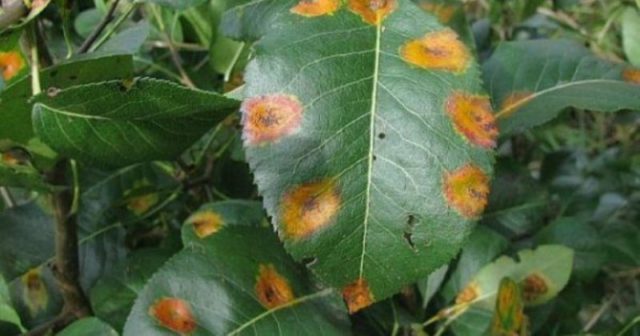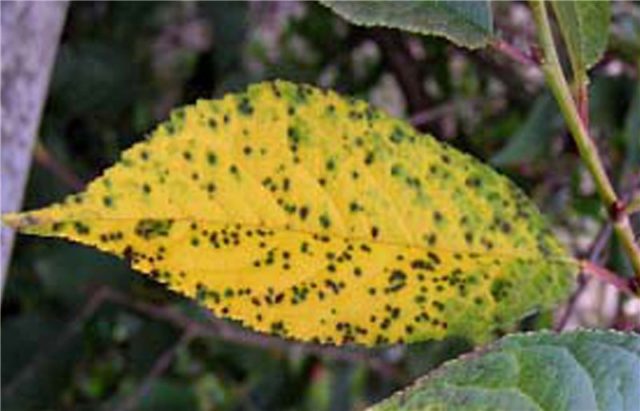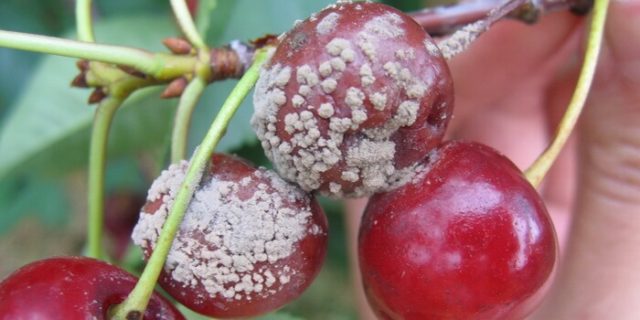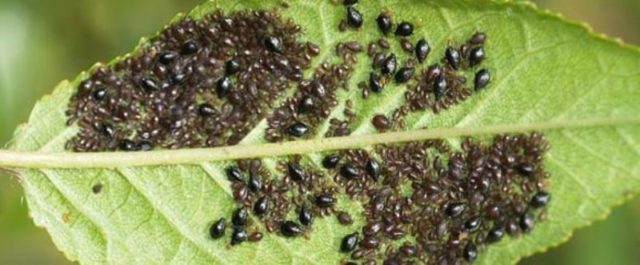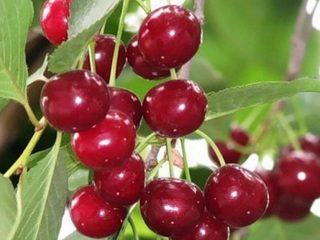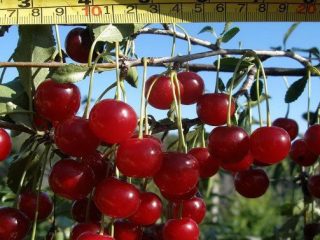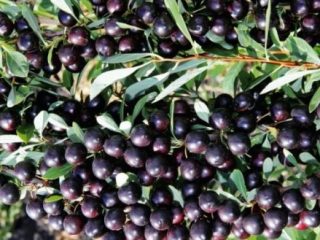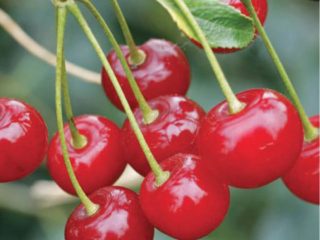Content
Almost every gardener grows cherries in his summer cottage. But to get a rich harvest, it is important to choose the right variety. It must be adaptable to climatic conditions, high-yielding and immune to many diseases. Cherry Igritskaya is suitable for growing in all regions of Russia, since the variety is unpretentious, frost-resistant, rarely exposed to fungal diseases and has positive qualities.
Description of Igritskaya cherry
Cherry Igritskaya is a relatively young variety. A short-stemmed tree with spreading branches was bred by Russian scientists at the Lupine Research Institute. The variety gained great popularity among gardeners in 2004. It is especially appreciated in regions with an unstable climate and cold winters.
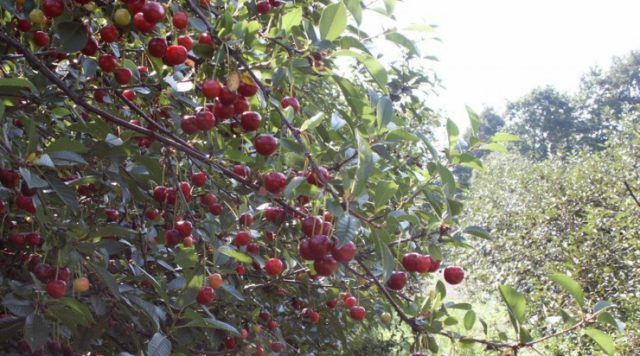
Spreading tree, small size
Height and dimensions of an adult tree
Cherry varieties Igritskaya forms a low tree about 2 meters high. In spring, the crown is covered with dark emerald, oblong leaves and snow-white flowers with a pleasant aroma.
Description of fruits
In the fifth year after planting, medium-sized semicircular fruits appear on the tree. Juicy, dense, dark red flesh is covered with a rich red skin. The small, oval bone separates well from the sweet and sour pulp.
Pollinators for Igritskaya cherries
Cherry Igritskaya is a partially self-fertile variety, but without pollinating varieties, about 50% of the berries are tied on the tree. But in order to collect the maximum yield from the tree, experienced gardeners recommend planting next to such varieties as: Zhuravka, Vladimirskaya, Zhukovskaya, Lyubskaya.
Main characteristics
Cherry Igritskaya is an unpretentious, late-ripening variety. Before buying a cherry sapling of the Igritskaya variety, you need to look at the photo, know the description and all the positive and negative sides.
Drought resistance, frost resistance
Cherry Igritskaya is frost-resistant, without shelter it can withstand frosts down to -30 ° C, therefore, the variety is often planted in regions with an unstable climate. But in order to preserve a young planted seedling and grow it into a small, spreading tree, in the first years, winter shelter with peat, humus or rotted compost is required.
The root system of cherries is shallow, therefore, in dry summers, regular and abundant watering is necessary. At least 10 water is consumed per adult tree. Cherries will also like rain irrigation, which is carried out in the morning or evening.
Yield
Cherry Igritskaya is a high-yielding variety. Subject to agrotechnical rules, an adult tree is capable of producing 8 buckets or more tasty, healthy berries for 5 years after planting. Productivity depends on the region of cultivation, the rules of care and the presence of pollinator varieties.
The harvested crop is suitable for making stewed fruit and jam. But before cooking, it must be remembered that the stone contains toxic substances, therefore, before preserving, the berry is washed, and the pulp is separated from the stone. Also, the berry can be frozen and dried.The dried crop is perfect for making tea and healing infusions.
Dried berries are stored in rag or paper bags in a dark, dry place. Shelf life is not more than 1 year.
Due to its dense skin, Igritskaya cherry tolerates long-term transportation and retains its taste and aroma for a long time.
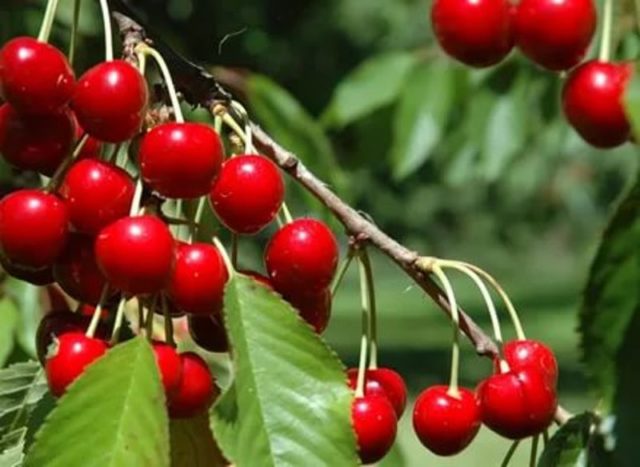
Ripe berry has a sweet and sour taste
Advantages and disadvantages
Cherry varieties Igritskaya has positive and negative qualities. The advantages of many gardeners include the following:
- high productivity;
- immunity to fungal diseases;
- dessert taste and versatility in application;
- unpretentious care;
- self-fertile;
- frost resistance.
The disadvantages include late fruiting.
Planting and caring for Igritskaya cherries
The cherry of the Igritskaya variety is an unpretentious tree, so it can be grown both in warm areas and in regions with an unstable climate. But in order to obtain a rich harvest, it is important to observe agrotechnical rules, to choose the right place for planting and to know the diseases and pests of cherries.
Recommended timing
A cherry sapling can be planted in spring and autumn. Spring planting is recommended for the northern regions, since during the summer period the tree will be able to build up a full-fledged root system and, once stronger, go into winter. In the fall, they are planted a month before the onset of cold weather. After planting, the trunk circle is abundantly shed and mulched.
Site selection and soil preparation
The health of the fruit crop, growth, development and yield depends on the correctly chosen place. Cherry is a light-loving culture, so the planting site should be located in the sun. In order for the tree to quickly get used to a new place, it is important to follow simple rules:
- The distance between seedlings is at least 3 m.
- Plant a seedling only on the south side.
- The location of groundwater is 1.5-2 m.
- The soil should be loamy or sandy loam.
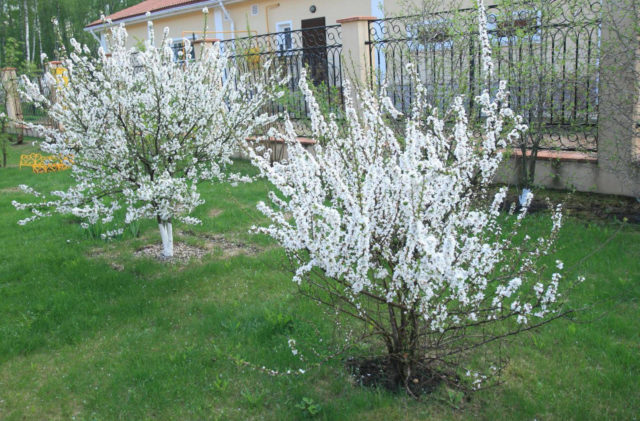
The distance between plantings should not be less than 3 meters
How to plant correctly
Planting a cherry seedling is not difficult work, but in order for it to grow and develop well, you need to heed the advice of experienced gardeners. Planting a young tree:
- The seedling is carefully examined. The roots should be free from damage and a sign of disease. The bark is evenly colored, without cracks and signs of rot. Skeletal branches are shortened before planting.
- They dig a hole 50x60 cm in size. The bottom is covered with drainage from broken bricks, pebbles or expanded clay. The excavated soil is mixed with humus, potassium chloride and superphosphate.
- At the seedling, the roots are straightened and set in the center. The voids are filled with a nutrient mixture.
- The top layer is tamped, spilled abundantly and mulched.
Care features
Despite its unpretentiousness, Igritskaya cherry needs proper care for high fruiting. After each watering, the soil is loosened and weeds are removed. In spring and autumn, carry out sanitary and formative pruning.
For good growth and development, acidified soil is mixed with lime or dolomite flour every 5 years. To protect planting from pests and diseases, prophylactic spraying with Bordeaux liquid or copper sulfate is carried out.
Watering and feeding schedule
Cherry Igritskaya is a drought-resistant variety. Watering is carried out only after the topsoil has dried out. An adult crop is watered 4 times a season:
- after flowering;
- during the period of active growth of the ovaries;
- after harvest;
- a month before the onset of frost.
Irrigation should be abundant; about 1 bucket of water is consumed per adult tree. In the autumn, the volume is doubled.
Top dressing is needed for abundant fruiting. The first feeding is carried out 2 years after planting. Over-matured compost, ammonium nitrate are applied in the spring.Potassium chloride, superphosphate or wood ash - in the fall. Top dressing is applied strictly according to the instructions on well-moistened soil.
Pruning
Pruning is an important step in caring for Igritskaya cherries. It will allow you to form a beautiful crown, get rid of dry and damaged shoots, and increase productivity.
The first pruning is done 1-2 years after planting. Lateral branches are shortened, inward and vertically growing branches are removed. The procedure is carried out in the spring, before bud break, or in the fall after leaf fall. Summer pruning is carried out only when necessary, removing damaged or diseased shoots.
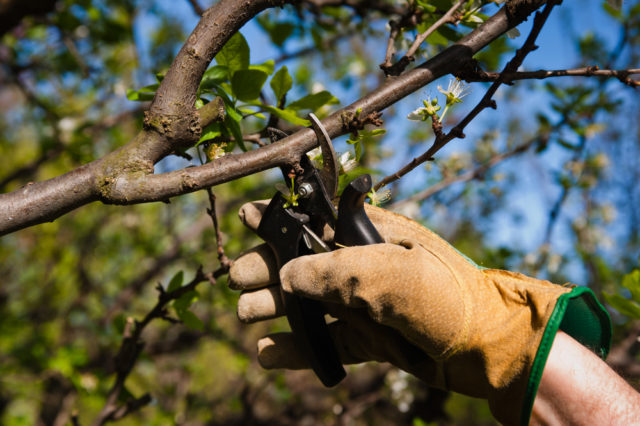
Pruning is carried out in spring and autumn.
Preparing for winter
Cherry Igritskaya is a winter-hardy variety. But in order for a young seedling to endure the winter well, it must be prepared:
- The trunk circle is dug up, spilled abundantly, mulched.
- The tree is fed with phosphorus-potassium fertilizers.
- The barrel is covered with a solution of lime, copper sulfate and PVA glue.
- After the first frost, the crown is sprayed with a 5% urea solution.
- The seedling is covered with a non-woven breathable material.
- To protect against rodents, a metal frame is installed.
Diseases and pests
Cherry Igritskaya possesses persistent immunity to diseases and pests. But if the rules of care are not followed, the tree may appear:
- Rust - numerous rust-colored stains appear on the leaf plate. Without treatment, the leaves fall off, the tree stops developing and leaves for the winter, weakened. The next year, there is no fruiting. You can help the tree by spraying it with copper oxychloride before flowering and after harvesting with Bordeaux liquid. All fallen leaves are collected and burned.
The fungus manifests itself in the first half of summer
- Coccomycosis is a fungal disease that affects foliage and fruits. Infection occurs before flowering. The foliage is covered with pale or bright red spots, over time it turns yellow and falls off. To combat the fungus, the tree is treated with 1% Bordeaux liquid.
A dangerous disease leading to the death of the plant
- Moniliosis - the disease appears after flowering. The bark becomes covered with a gray growth, the fruits rot, the branches crack, releasing gum. Treatment consists of treatment with broad-spectrum fungicides.
Without treatment, yields decrease
- Aphid - an insect appears in early spring. Pests settle in large colonies, suck out the sap, the tree weakens, lags behind in growth and development. The fight is carried out with insecticides at a temperature not lower than + 5 ° C.
Pests settle on the inside of the leaf
Conclusion
Cherry Igritskaya is an ideal variety for growing in regions with cold, long winters. Subject to the rules of care and preventive measures, the tree will delight you with a bountiful harvest. Due to its sweet and sour taste, the berry is suitable for making preserves for the winter.
